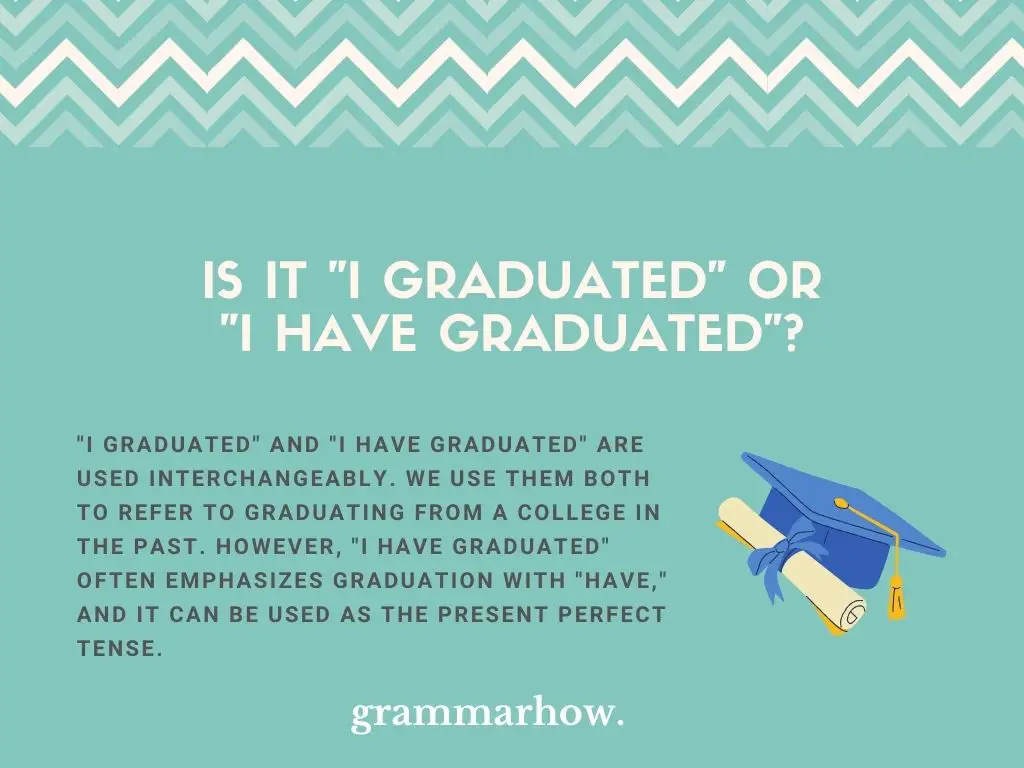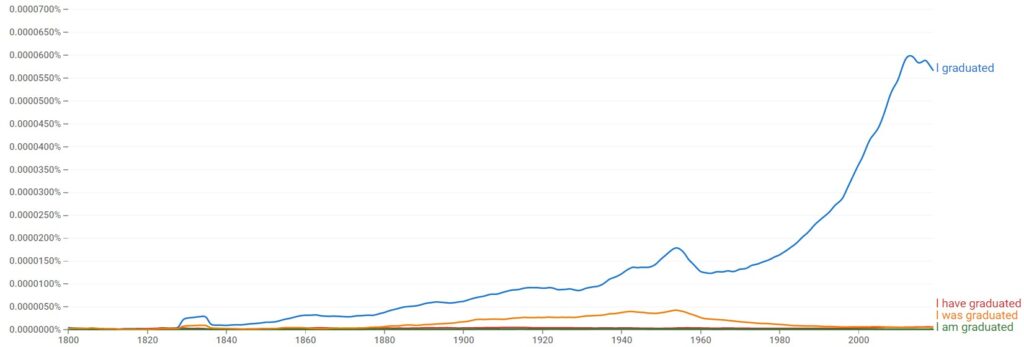Verb tenses often play a big role in our writing. It would help to know how they work, and this article will explain how “I graduated” and “I have graduated” work. You should understand when to include “have” (or any other verb) between the words.
Is It “I Graduated” or “I Have Graduated”?
“I graduated” and “I have graduated” are used interchangeably. We use them both to refer to graduating from a college in the past. However, “I have graduated” often emphasizes graduation with “have,” and it can be used as the present perfect tense.

The present perfect tense refers to something that has just happened or is continuing to happen in the present. For example, if someone graduated last week, they might use “I have graduated” to highlight just how recently their graduation happened.
“I graduated” is known as the simple past tense. It can refer to graduation that took place at any point in the past (recently or not). It doesn’t use “have” to stress the graduation. It’s just a simple way to show that you graduated at some point.
| Verb | To graduate |
| Simple past | I graduated |
| Present perfect | I have graduated |
I Graduated
“I graduated” is correct when you are using it to refer to graduating in the past. It’s a good choice because it allows you to show that you had successfully achieved your degree without needing to be specific about any time when that took place.
You don’t need any auxiliary verbs when using the past tense in this way. Only a pronoun needs to come before “graduated.”
- I graduated from that college a long time ago. I really don’t fancy going back to it anytime soon.
- You graduated from there already, didn’t you? I could have sworn you spent years trying to get your degree.
- I graduated, but I’m not pleased with my finishing result. I’m sure I could go back and do even better today.
- We graduated from the same university. I’m quite impressed that we were both able to manage it.
- He graduated just like he always said he would! We’re both so proud of the man he’s turning into!
I Have Graduated
“I have graduated” introduces “have” to the equation. It’s correct to use this when referring to the recent graduation that took place. “Have” might also allow you to emphasize the fact that you have graduated (i.e. if someone has asked if you have completed your course).
The present perfect tense uses “have” as an auxiliary verb. It always refers to something that started happening in the past (i.e. starting your qualification) and continues or finishes in the present (i.e. completing your graduation).
- I have graduated from university, and I couldn’t be happier! I’m so glad that all my hard work has finally paid off.
- We have graduated at long last! It’s about time because now we can finally move on to new and exciting aspects of our lives.
- I have graduated once again. I now have three degrees under my belt, and I’m planning on getting a couple more going forward.
- You have graduated! You must be so proud of yourself! I always knew you’d amount to something special!
- I have graduated, but I still feel like I could work toward something else. Maybe I will continue on until I get my Master’s.
I Am Graduated
“I am graduated” is never correct to use. Native speakers do not use “am” in this context because it makes no sense to refer to yourself as “graduated.” “Graduated” is not a noun. It is a verb, which is why you can’t be “graduated.”
If you were going to use “am,” you would have to use it with the noun form “graduate:”
- I am a graduate.
However, the past tense verb “graduated” makes no sense.
- Correct: I have graduated from the college I went to for five years. It feels weird because it was such a big part of my life.
- Incorrect: I am graduated from university at long last. I don’t think I’m ever going to want to go back to something like that.
- Correct: You graduated just like you always said you would! I knew I could count on you to be the first of us to make it!
- Incorrect: I am graduated from college! I can’t wait for whatever comes next in my life.
I Was Graduated
“I was graduated” is an old-fashioned verb form that makes no sense today. Nobody uses “was” in any case when they’re talking about successfully completing their degree at their chosen college.
Just like “am,” “was” only works when you are using “graduate” as a noun form. It cannot apply when you are using it as a verb.
As a noun, the following makes sense:
- I was a graduate.
As a verb, “was” cannot work:
- Correct: I have graduated again. I feel like I’ve got so many degrees to my name now, and I just want to keep going.
- Incorrect: I was graduated from Harvard for a long time. Now, it’s time for me to get back in and get a new degree.
- Correct: I graduated from this place with ease. I always knew that I’d find my calling in life once I started going here.
- Incorrect: I was graduated from this college before, so I can help you understand everything you need to know about it.
Which is Used The Most?
According to Google Ngram Viewer, “I graduated” is used the most. This means it’s the best choice of all of them to use, and it’s the one that you’re more likely going to come across when discussing graduation with any English speaker.

Final Thoughts
You should only use “I graduated” or “I have graduated.” They are the only two forms that make grammatical and idiomatic sense in your writing. If in doubt, always stick to “I graduated” because it’s the one that’s most commonly seen. “I am graduated” should be avoided.
You may also like:
Is It “Graduated College” or “Graduated From College”?
“Graduate Of” or “Graduate From” or “Graduate At”?
Graduate Student or Graduated Student? (Correct Version)
Graduated From The University or Graduated From University?

Martin holds a Master’s degree in Finance and International Business. He has six years of experience in professional communication with clients, executives, and colleagues. Furthermore, he has teaching experience from Aarhus University. Martin has been featured as an expert in communication and teaching on Forbes and Shopify. Read more about Martin here.
